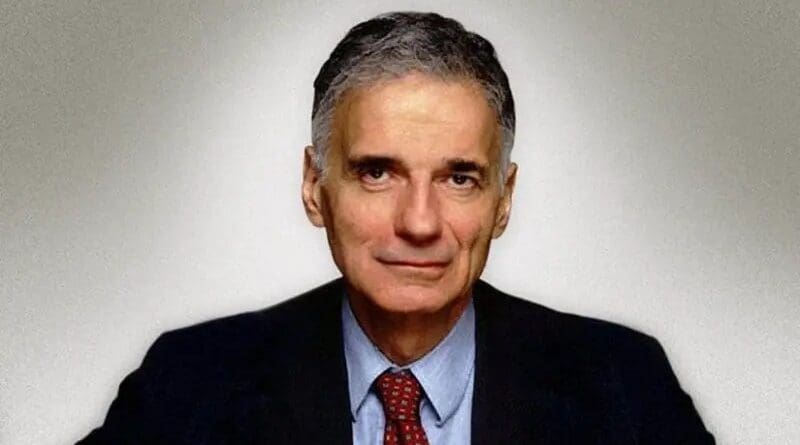Ralph Nader: Reckless Capitalist Banks Rescued By Government Socialism, Again – OpEd
By Ralph Nader
Once again, government socialism – ultimately backed by taxpayers – is saving reckless midsized banks and their depositors. Silicon Valley Bank (S.V.B) and Signature Bank in New York greedily mismanaged their risk levels and had to be closed down. The Federal Deposit Insurance Corporation (FDIC), in return, to avoid a bank panic and a run on other midsized banks went over its $250,000 insurance cap per account and guaranteed all deposits – no matter how large, which are owned by the rich and corporations – in those banks.
Permitting such imprudent risk-taking flows directly from the Trump-GOP Congressional weakening of regulations in 2018, which was supported by dozens of Democrats, led by bank toady Senator Mark Warner (D-VA). That bipartisan deregulation provided a filibuster-proof passage by the Senate.
The other culprit is the Federal Reserve. Its very fast interest rate hikes reduced the asset value of those two banks’ holdings in long-term Treasury bonds, which reduced their capital reserves. With the “what, me worry” snooze of the California Department of Financial Protection and Innovation, S.V.B had little supervision from state regulatory examiners and compliance enforcers.
Actually, big depositors sniffed the shakiness of these two banks and acted ahead of the regulatory cops with mass withdrawals that sealed the fate of S.V.B. Imagine, S.V.B was giving out bonuses hours before its collapse. For this cluelessness, the bank’s CEO, Gregory Becker, took home about eleven million dollars in pay last year.
All this was predicted by Senator Elizabeth Warren and Rep. Katie Porter. Warren, in particular, specifically opposed the 2018 Congressional lifting of stronger liquidity and capital requirements along with regular stress tests for banks with assets over $50 billion. Trump’s law allowed the absence of these safeguards to cover banks with assets up to $250 billion. Such de-regulation covered S.V.B and Signature.
Signature Bank had former House Banking Committee Chair Barney Frank on its board of directors. His name is on the Dodd-Frank Wall Street Reform and Consumer Protection Act, which was passed following the 2008 Wall Street collapse. Even Mr. Frank was clueless about what Signature’s CEO Joseph DePaolo was mismanaging. (DePaulo was paid $8.6 million last year.)
Of course, the underfunded FDIC doesn’t have enough money to make good all the large depositors in these two banks. So, it is increasing the fees charged to all banks for such government insurance. The banks will find ways to pass these surchargers on to their customers.
Other midsized banks may be shaky as more major depositors pull out and put their money into mega-giant banks like JPMorgan Chase, Bank of America and Citigroup, which are universally viewed as “too big to fail.” The smaller businesses harmed by these closed banks are now on their own. No corporate socialism is as yet saving them.
One of the provisions of the Dodd-Frank law was to require federal agencies to rein in bank executives’ pay that incentivizes recklessness and even fraud, as Public Citizen noted. Yet after 13 years, PC declared: “a hodgepodge of federal agencies – the Federal Deposit Insurance Corporation, the Federal Housing Finance Agency, the Federal Reserve, the National Credit Union Administration, the Office of the Comptroller of the Currency, and the Securities and Exchange Commission – that is supposed to finalize the rule has so far failed to do so.”
Defying mandates of Congress, often riddled with waivers from Capitol Hill, is routine for federal agencies. They know that when it comes to law and order for profiteering corporations, Congress is spineless. Have you heard of any resignations or firings from these sleepy regulatory agencies? Of course not. They continue to raise the ante for corporate socialist rescue even beyond their legal authority. For example, where does the FDIC get the authority to guarantee all the deposits in the failed banks when the Congressional limit is strictly $250,000 per account?
Some people will remember Secretary of the Treasury Henry Paulson telling the Washington Post that there were “no authorities” for massive bank bailouts – think Citigroup in 2008 during a private weekend meeting in Washington, DC – but, he said, “someone had to do it.”
Meanwhile, the American people remain fearful but silent over the safety of their bank deposits. They heard Treasury Secretary Janet Yellen tell Congress that the banking system “remains sound.” Some remember that’s what her predecessor said in the spring of 2008 about Fannie Mae and Freddie Mac – the safest investments after Treasury bonds. By the fall, both of these giants had collapsed taking millions of trusting shareholders down with them.
Finally, all those brilliant economists at the Federal Reserve surely must know that when midsize banks lose almost 20% on the value of their 10-year Treasuries, due to the very fast interest rate hikes by Jerome Powell’s Fed, trouble is on the horizon. Why didn’t they anticipate this outcome and do some foreseeing and forestalling? Nah, why worry, didn’t you know that the Fed prints money?
Or maybe the Federal Reserve (its budget comes from bank fees, not the Congress), couldn’t see beyond fighting inflation, something it did not take seriously in time over a year and a half ago. More than a few outside economists repeatedly gave the Fed fair warning. But then the Fed, hardly ever criticized by the mainstream press, was listening to its brilliant economists.
Stay tuned. This rollercoaster ride is not over yet.

